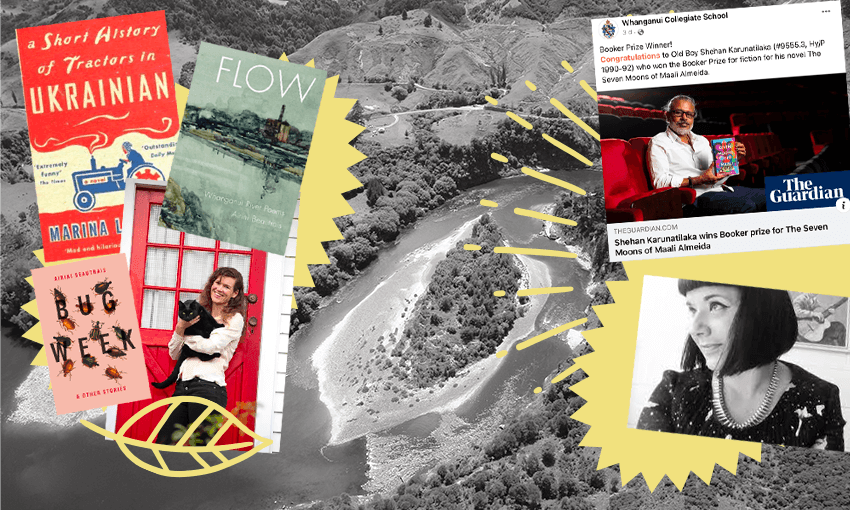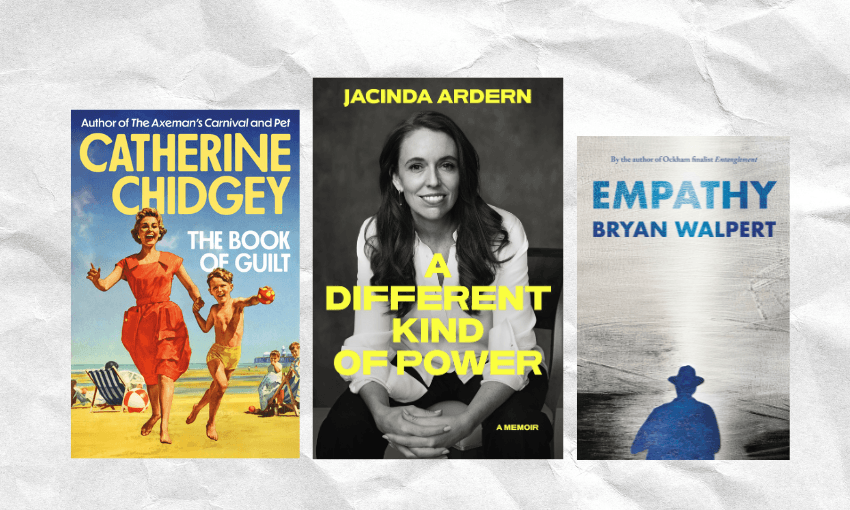Books editor Claire Mabey considers the literary tradition of Whanganui after the Booker prize win by Shehan Karunatilaka, who went to school there in the 90s.
Last week the Booker Prize, one of the most renowned literary awards in the world, was won by Sri Lankan writer Shehan Karunatilaka. Pop star Dua Lipa headlined the ceremony in London with an excellent speech about the value of reading, while Her Majesty the Queen Consort (aka Camilla) handed out the goods.
The Booker judges said that Karunatilaka’s genre-mashing novel The Seven Moons of Maali Almeida, set in 1990 during the Sri Lankan civil war, “is a deeply humane novel about how to live in intolerable circumstances, about whether change is possible, and how to set about coping if it’s not.” (Himali McInnes’ review of the novel will appear here on The Spinoff in December, once the book arrives on our shores – international shipping issues and paper shortages have plagued publishing this year).
Meanwhile, it has emerged that in the 1990 of real life, Shehan Karunatilaka was in Aotearoa, attending Whanganui Collegiate, a boarding school championing “five pillars of academic excellence; sporting achievement; cultural enrichment; Christian fellowship; lifelong friendships …’
When the Booker news hit, the school’s Facebook page celebrated the win for the old boy, while the NZ Herald reported Lesley Stead from Paige’s Book Gallery (the indie bookshop of Whanganui) saying, “It’s a tremendous acknowledgement for Whanganui and the school. We have a strong literary tradition here which Shehan has now strengthened.” In the same article, Simon Cairncross, a former Whanganui Collegiate student who attended at the same time as Karunatilaka, said: “This one is a pretty impressive prize for a Whanganui-educated person.”
Karunatilaka’s Booker win is the most prestigious international literary prize the city can make claim to thus far. But it is far from the only link to bookish magic for Whanganui, which is also associated with the internationally-lauded concept of legal personhood, and its 104-year-old Durie Hill elevator service run by Taite Music Prize-winning musician Anthonie Tonnon.
In 2005, a novel called A Short History of Tractors in Ukrainian by British-Ukrainian Marina Lewycka was longlisted for the Booker Prize. A NZ Herald article in the same year reported that Lewycka and her husband were living in Whanganui, where she could write for eight hours a day uninterrupted by repeated calls on her time (“In England they work you terribly hard. They would have you doing two or three readings a week if they could.”). Lewycka said she found New Zealand similar to Ukraine in that it’s a “peaceful, no-nonsense farming country”. At the end of the article is a notice announcing that for $5 you could come to Whanganui’s Alexander Library to hear Lewycka read from her novel and ask questions, with drinks and nibbles included. $5! Incredible!
Sadly, a few years later a Stuff article reported that Lewycka’s terminally ill husband had filed a complaint with the then justice minister Simon Power because he was fed up with a system that had first refused to give Lewycka residency in Aotearoa and was now making it difficult to obtain a divorce. So, while it was a brief stint, Lewycka’s time here was enough to weave another Booker connection into the fabric of Whanganui.
Airini Beautrais is one of Whanganui’s most acclaimed writers, with six generations of her family having grown up in the area. In 2021 Beautrais won the coveted Jan Medlicott Prize for Fiction at the Ockham New Zealand Book Awards with her compelling, urgent short story collection, Bug Week. And in 2017 Beautrais published a widely praised collection of poetry called Flow, the same year that the subject of the book, the Whanganui River, was granted legal personhood in a profound step into a Te Ao Māori approach to equitable relationship with the natural environment.
On the connection between writing and Whanganui itself, Beautrais says, “I have strong ties to Whanganui and I have found that over the years I’ve been writing, it always finds its way into a lot of my work. All my poetry collections feature Whanganui in some way, Flow most of all. Many of my stories are set here and as I think about new stories it always feels like the logical setting.”
Another writer and former Whanganui resident, Kiran Dass, reflects: “Moving to Whanganui was a revelation and a life-changing experience for me. Whanganui’s engagement with and respect for its rich history and cultural and social heritage is something I found incredibly profound and inspiring.”
The history of Whanganui includes revolutionary nun Suzanne Aubert, whose extraordinarily productive community of Sisters at Jerusalem has inspired a book of fiction by Fleur Beale (The Calling is a brilliantly satisfying YA novel about a young woman who thinks she wants to be a nun), and biographical accounts by Jessie Munro and Meri Hōhepa. Whanganui literary history has also been long-associated with poet James K Baxter who, after leaving writer Jacquie Sturm (his wife), set up a community by the River in the 60s where he died and was buried a decade later.
When asked about the environment for writing, Dass says: “When I moved to Whanganui it was astonishing to me how many writing opportunities opened up. I don’t know why I didn’t do it sooner! I could actually make a living writing full time there, something I was a little afraid of trying to do when I was living in Auckland. In my first week in Whanganui I was welcomed into a writers group. Whanganui is just that sort of easy, welcoming place. This was a community I’d never had before.”
In terms of fostering young talent, Whanganui High School has a regular writers’ group run by teacher Tim Sutherland, who says “We meet once a week during a lunch break and have just a few very passionate writers. They mostly write creatively, and over the years we’ve had all sorts come through the club. Some have written scripts, short stories – one of our students even wrote a whole novel, which they’re in the process of editing!”
With Whanganui’s house prices falling (according to the latest OneRoof report) to vaguely dreamable territory, its beautiful river with a history longer and richer than any one person’s, and its links to the Booker Prize and award-winning Aotearoa writers, the city’s writerly environment seems a generative one. Shehan Karunatilaka is rumoured to be relocating back to Aotearoa in 2023: it’s not yet known as to where, but we’re guessing he’ll always be welcome in Whanganui.



